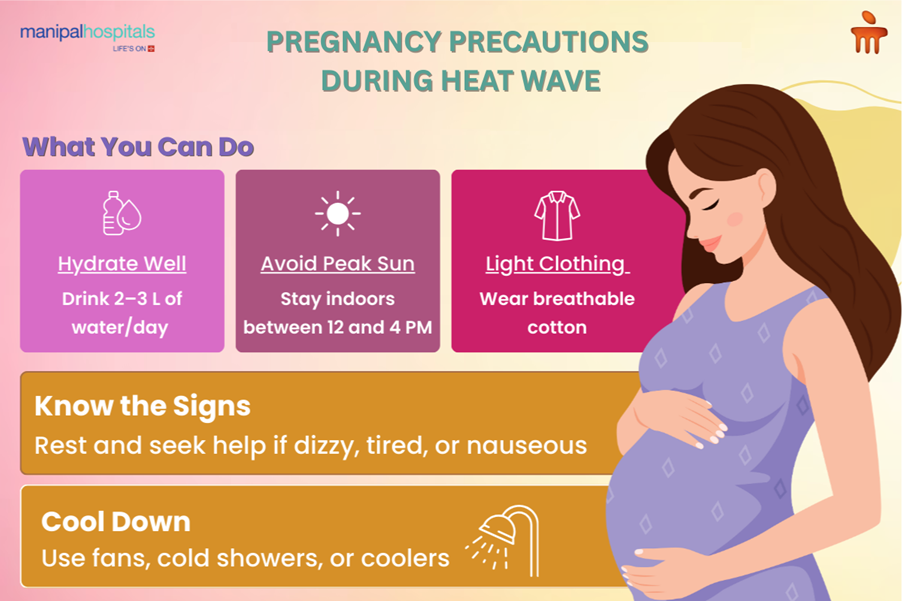
Research indicates that rising worldwide temperatures harm female reproductive health. Long-term exposure to hot environmental conditions leads to multiple pregnancy complications, which harm mothers and their developing babies. Heat stress affects the balance between hormones while interfering with regular menstrual periods and reproductive health. This blog analyses protective measures and potential hazards to heat-stressed and pregnant females during heat waves.
Synopsis
Risks to Maternal and Fetal Health During Heat Waves
Pregnant women are more vulnerable to heat waves since their normal thermoregulation and heart pumping function changes, which creates greater risks for pregnancy complications. The below list contains the main dangers that occur during hot weather:
-
Miscarriage and Preterm Labour: High core body temperatures caused by heat result in spontaneous miscarriage and premature labour, which deteriorate maternal wellness.
-
Stillbirth and Low Birth Weight: Prolonged heat stress permanently affects placental function, which creates multiple serious birth complications, including stillbirth, with low birth weight infants, among other reproductive health risks.
-
Birth Defects: The embryonic-phase exposure to high heat leads to neural tube defects and various other birth abnormalities, which severely damage maternal well-being as well as foetal growth.
-
Amniotic Fluid Loss: Heat stress, with dehydration, leads to lowered amniotic fluid volumes, which restricts fetal development and movement and causes more pregnancy complications during labour.
-
Electrolyte Imbalance: Heat-related electrolyte imbalance among pregnant women disrupts the cardiovascular and renal systems and deteriorates their general wellness because of extreme temperatures and low fluid consumption.
Impact of High Temperatures on Female Fertility
High temperatures interrupt both conception ability and damage fundamental reproductive well-being. Let us describe how heat stress creates adverse effects on female fertility:
|
Effect |
Explanation |
|
Reduced Egg Quality |
Long-term exposure to high temperatures damages egg quality, leading to conception difficulties and pregnancy problems in hot climate zones. |
|
Hormonal Imbalance |
Heat waves disrupt hormonal balance, negatively affecting women's reproductive health. |
|
Disrupted Ovulation |
High temperatures interfere with the hypothalamic-pituitary-ovarian axis, leading to ovulation problems and complications in fertility and childbirth. |
|
Irregular Menstrual Cycle |
Heat stress affects the endocrine system, causing irregular menstrual cycles and reduced fertility. |
|
Elevated Cortisol Levels |
Heat-induced stress raises cortisol levels, which can disrupt reproductive hormones and hinder conception efforts. |
Long-Term Health Effects of Prenatal Heat Exposure
In-utero exposure to high temperatures has lifelong consequences for children’s physical and cognitive development.
-
Increased Risk of Cerebral Palsy: Studies link maternal heat stress during childbirth with a 2.5 times higher risk of cerebral palsy in children, showing the long-term cost of ignored pregnancy complications.
-
Weakened Immune Development: It can impair foetal immune system programming, affecting childhood disease resistance and long-term reproductive health.
-
Developmental Delays: Exposure to high temperatures in utero can impact cognitive function, learning, and behaviour, with effects manifesting during school years and beyond.
-
Increased Cardiometabolic Risk: Children exposed to heat stress prenatally are more likely to develop obesity, diabetes, and heart disease due to altered foetal growth patterns and stress hormone exposure.
What Precautions Should Pregnant Females Take?
Simple strategies can help pregnant women manage the situation and avoid serious pregnancy complications during high-temperature months. Here’s how to stay protected:

When to Seek Immediate Medical Help?
Specific symptoms should not be ignored, as they may indicate severe pregnancy complications due to heat stress. Seek urgent care if you experience:
-
High Fever with Contractions: A high body temperature during labour could indicate infection or foetal distress caused by heat stress and must be addressed promptly.
-
Persistent Dizziness or Fainting: Ongoing dizziness, especially when accompanied by blurred vision or weakness, can suggest dehydration or hypotension from high temperatures.
-
Reduced Foetal Movements: If the baby’s movements drop, it might reflect distress due to extreme heat; consult your doctor immediately to ensure foetal safety.
-
Severe Headache and Swelling: These could signal preeclampsia or another hypertensive disorder worsened by heat stress, endangering maternal health.
-
Signs of Labour Before Term: Any vaginal bleeding, cramps, or contractions before 37 weeks during a heatwave should be treated as a medical emergency.
Consult our top obstetrician and gynaecologist in Manipal Hospital's Whitefield for expert treatment.
Conclusion
Global warming and heat stress have profound effects on reproductive health, especially during pregnancy. From disrupting female fertility to causing severe pregnancy complications, high temperatures are now a growing concern for public and maternal health. With climate change worsening yearly, awareness and timely precautions are essential to safeguard mother and child. For expert care and support, visit the OBG department in Manipal Hospital's Whitefield.
FAQ's
Yes, heat stress can disrupt hormone levels and interfere with ovulation during summer months, which may affect female reproductive health and fertility.
Pregnancy is generally safe with precautions. However, take special care during this time – it is wise to avoid high temperatures, stay hydrated, and monitor your health to prevent any pregnancy complications.
Dehydration from heat waves can have adverse effects on the growing foetus – it may reduce amniotic fluid and affect fetal growth and maternal health.
Yes, postpartum women are at risk during extreme heat events. Heat stress can affect sleep, mood, and recovery in some women during the postpartum period. This may also impact mental and reproductive health.
If you feel dizzy or tired and are outside during sunny weather, rest in a cool place, drink water, and if symptoms persist, seek medical help immediately to avoid serious pregnancy complications.





















 5 Min Read
5 Min Read

















